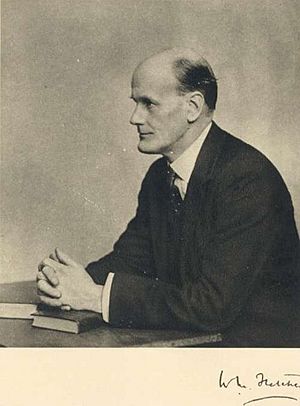Walter Morley Fletcher facts for kids
Quick facts for kids
Sir Walter Fletcher
|
|
|---|---|

Walter Morley Fletcher (1873-1933)
|
|
| Born | 21 July 1873 |
| Died | 7 June 1933 (aged 59) |
| Nationality | English |
| Alma mater | Trinity College, Cambridge |
| Known for | Muscle physiology |
| Scientific career | |
| Fields | Physiologist |
| Institutions | Cambridge University |
| Academic advisors | John Newport Langley |
| Notable students | Archibald Hill |
Sir Walter Morley Fletcher, KBE, FRS (born July 21, 1873 – died June 7, 1933) was an important English scientist. He was a Physiologist, which means he studied how the human body works. Fletcher is best known for leading the Medical Research Council (MRC) in the years between the two World Wars. Under his guidance, Britain became a world leader in medical and biological research.
Contents
Sir Walter Fletcher: A Science Leader
Sir Walter Morley Fletcher was a key figure in British science. He was not only a scientist but also a skilled administrator. This means he was good at managing large organizations. His work helped shape how scientific research was done in the United Kingdom.
Early Life and Education
Walter Fletcher was born on July 21, 1873. He studied at Trinity College, Cambridge, a famous university in England. There, he learned about how the body functions. This education prepared him for a life dedicated to science and its advancement.
Leading the Medical Research Council
Fletcher's most important role was leading the Medical Research Council (MRC). He took on this job during the "interwar years." This was the time between World War I and World War II.
What is the MRC?
The Medical Research Council is an organization that supports health research. It gives money to scientists to study diseases and how the human body works. The MRC aims to improve human health through scientific discoveries.
Focusing on Basic Research
When Fletcher led the MRC, he made an important decision. He decided to focus funding on "basic scientific research." This type of research aims to understand how things work, just for the sake of knowledge. It doesn't always have an immediate practical use. For example, studying how a single cell works is basic research.
This was different from "clinical research," which focuses on treating patients directly. Fletcher believed that strong basic research would lead to bigger breakthroughs later on.
His Impact on Science
Under Sir Walter Fletcher's leadership, the MRC became very successful. His focus on basic science helped Britain become a leader in "biomedical research." This field combines biology and medicine to understand health and disease. His work laid the groundwork for many future medical discoveries.
 | James B. Knighten |
 | Azellia White |
 | Willa Brown |

